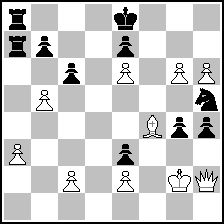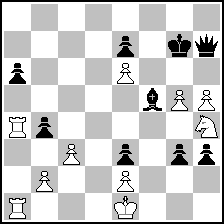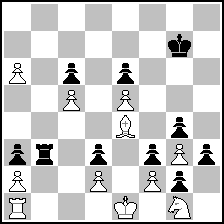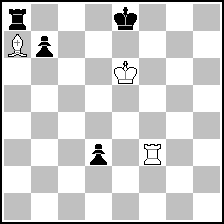
Website founded by
Milan Velimirović
in 2006
18:01 UTC


| |
MatPlus.Net  Forum Forum  Endgame studies Endgame studies  Darko Hlebec, HvdH 50 JT, special prize Darko Hlebec, HvdH 50 JT, special prize |
| |
|
|
|
|
You can only view this page!
| | Page: [Previous] [Next] 1 2 3 | | (41) Posted by Nikola Predrag [Wednesday, Nov 16, 2011 00:52] |
It is unbelievable that someone can talk so very, very much, successfully missing all relevant points of the very content of his own talk.
| | | (42) Posted by Kevin Begley [Wednesday, Nov 16, 2011 00:58]; edited by Kevin Begley [11-11-16] |
It's really easy Nikola -- I read a sentence like the one you just offered, and I find virtually no relevant meaning in it.
Here's another you offered in this thread:
>"For special problems the judges introduce special criteria to reach a fairly balanced award."
That's especially deep. :)
Does it follow that in problems which were awarded the "Extraordinary-Prize," the judge must have introduced some extraordinary criteria?
| | | (43) Posted by Kevin Begley [Wednesday, Nov 16, 2011 02:06]; edited by Kevin Begley [11-11-16] |
I'm sorry to Siegfried, for having taken up so much space in his thread with this matter...
If he had simply stated, "Harold van der Heijden gave the correct distinction here" -- a Prize -- I would have no reason to disagree.
But, he went on to state that this problem "should not be compared to other studies..."
I am yet to hear a rational explanation for why a comparison is impossible (or why a "special" ordinal is necessary).
There seems no shortage of people who disagree with me, yet none of them (save Per) has provided a single reason why this comparison is not possible.
I don't find Per's reason particularly credible.
First, he argued that comparison is impossible because it can not produce a "balance" (read: an ideal comparison).
This is circular logic -- the equivalent of stating, "an ideal comparison is never possible without special awards, because special problems can not be fairly compared (balanced)."
Furthermore, the FIDE Album (which awards no special prizes to any of the many special problems sent) could not possibly, by his reasoning, achieve "balance."
Yet, there is no indication that he accepts the logical conclusion of his own hypothesis, nor has he pointed to evidence of how the Album is out of balance.
Second, he goes on to argue that a fairly balanced comparison is inherently hidden in the geometrical presentation of several "special" awards.
That's a clear contradiction of his own circular logic -- I'm sorry, but nobody could accept this as a valid reason for awarding non-ordered "special" ordinals.
I have given my philosophy as to the role of a judge (both in terms of jurisdiction, and ideals).
These ideals, I believe, explain why the vast majority of all competitive art forms require awards which conform to a linearly ordered set.
This goes for all of the most respected awards in chess composition (FIDE Albums, WCCCs, World Cups, etc).
So, I'll try to wrap this up, in the simplest possible terms...
I have only a single question:
Can anyone provide a valid reason (or even a philosophy) which helps explain why it might be impossible to compare any two problems, in any given casual tourney (or why the award can not be presented in a linearly ordered fashion)?
That's all I want to know.
Thank you.
| | | (44) Posted by Sarah Hornecker [Wednesday, Nov 16, 2011 04:09] |
Okay, here you go:
The study manages to take that certain kind of studies - namely those with sacrifices on b8 - to a new level by showing two of those in the actual play. The prize is - we agree - justified by the overall quality of the study. So why the special?
QUOTE
The sacrifice on b8 to prevent castling is known [..], but not as an echo. The conclusion is enjoyable.
Here we go? Or not? A well known theme is doubled. On the opposite, the starting position sees White overwhelmed with threats and he has not any choice other than sacrificing the queen to even stay in the game. The study is a great achievement, but it is not perfect.
Still, this applies to many studies. So what makes it special? Well, most components of the study are known on their own but not in this combination. It is a beautiful symbiosis of well known ideas.
The queen sacrifice is known from Hornecker & Roxlau, Die Schwalbe 2005, 2nd prize, as well as EG 2005.
 (= 10+10 ) (= 10+10 )
Black to move, White wins
 (= 10+9 ) (= 10+9 )
Draw (corrected version, EG 157)
The rook sacrifice is well known, first by Reino Heiskanen, Tidskrift för Schack 1967, although I was first (Variantim 2004) to show it with a White sacrifice. Here is the Heiskanen study:
 (= 11+10 ) (= 11+10 )
Win
The general idea of such sacrifices goes back to the famous study of Moravec in Duvtip 1931.
 (= 3+4 ) (= 3+4 )
Win
Yet, Hlebec is first to show two such sacrifices in a single study. His achievement must be honored, indeed.
| | | (45) Posted by Nikola Predrag [Wednesday, Nov 16, 2011 16:07] |
Although a prefix 'special' is well accepted and instinctually understood in our community, the disscussion may improve our consciousness about the 'self-evident'. Since the disscussion went astray to variants of skating, beauty contests etc., I wrote a simple and 'shallow' post 7. Many of the posts that followed show that it was relevant. And quite enough reasons were presented to support the various facets of judging in the community of chess composition.
Our Codex is a wise basic concept, giving gudelines and a great freedom to explore the principles of chess composition. Only a small population of humans is able to participate in it. So, it is not popular widely nor commercial. Protected from the global idea of profit and glory, we may function best without very strict rules and mathematical measurement. Literal projections and comparisons from the 'outer world' are highly irrelevant and intrusive. External principles or customs may be disscussed IF they can be naturally adjusted for chess composition, but WHY? in the first place, as Jacques wrote in post 39. Many posts, without a single reason why the 'special' MUST NOT BE or why a perfectly precise measurement MUST BE.
An 'ordinary' tourney with many entries usually presents 10-20 distinctively ranked compositions. A FA judge will distribute hundreds of entries in much less number of ranks. He will be most carefull to decide about the ranks 2,2.5 and 3 pts.. But only 2 ranks are of final importance - FA or NOT FA. The Codex does not ask a judge to measure the art and give the ranking. The meaning of a number given by a judge does not represent a quantity. An impression of a wholeness of many features including special ones, makes a judge to say: it 'could', 'should', 'ought' or else, without any further explanation. This shows what the Codex thinks about the precise measurment and competitiveness of the art.
In the ordinary tourneys, a judge may be expected to name a winner and a sort of ranking, to add some flavour of competition. But again, how I read the Codex? A judge should select the entries which deserve a closer look of the public and distribute them justifiebly in 3 levels of 'quality'. It is easy with clear, original, perfectly constructed and complex entries (and yet, among these to decide which one is better). But for the simplier or imperfect entries may be difficult to determine a basic level, not to speak of precise ranking.
I already wrote too much, especially about things that anyone can see, if he tries to look.
| | | (46) Posted by Sarah Hornecker [Wednesday, Nov 16, 2011 21:37] |
No, Nikola. All your statements were fine, except this last one!
QUOTE
I already wrote too much, especially about things that anyone can see, if he tries to look.
You did NOT write too much. I would love to see more or your thoughts on this subject of rankings, special rankings, etc.
I believe there are another interesting kinds of justification for special rankings: A beginner had his first study published in an informal tournament, but it turns out to be anticipated. In my opinion the study should be ranked with a special ranking to encourage him composing, while also clearly stating the predecessor. This might lead - in cases of full anticipation - to a distinction that is equal to no distinction at all. I did a similar thing, although with a much different kind of reason, in one of "my" tourneys, my first judged one.
The late Julien Vandiest had participated there with a study that was not sufficient for a commendation in view of the many similar studies by himself, but it was clearly visible that the study belonged into Vandiest's systematic exploration of QBvQ. So I did an interesting stunt by mentioning Vandiest in the award, giving him a special mention in the award (not as a ranking) for his lifetime achievement without giving a distinction towards his study. Here in my translation. The text in sharp parentheses [] was not in the original award but added to the English version, making it more comprehensive. Download: http://chessproblem.net/viewtopic.php?f=28&t=358
QUOTE
[Special mention for a lifetime achievement]
At the end 16.098 by Julien Vandiest must be mentioned that in itself can’t receive a distinction because there are many similar works of the same author. It however is part of a much bigger composition series that lasts since 1947 (the actual study is in a part of it where research has begun in 1985) where Julien Vandiest is researching the ending queen and bishop versus queen with and without pawns and by that the author in honoration of his comprehensive work deserves this [special] mention in the award.
| | | (47) Posted by Kevin Begley [Thursday, Nov 17, 2011 12:26]; edited by Kevin Begley [11-11-17] |
@Siegfried,
Let me get this straight:
1) You are admitting to having maliciously applied a bias in your judgement?
2) You are advocating for other judges to apply a cognitive bias?
We are friends -- I hope we stay friends -- but, I must tell you:
I hope, one day, you come to understand the seriousness of the error in your judgement; and, I hope you find atonement for it.
FYI: lifetime achievement awards are presented to individuals -- they are not attached to a single work -- particularly when the single work does not reflect well upon the larger body.
Yet, you have attached this not only to a problem which does not reflect well upon the larger body of works by this composer (may he rest in peace), but also to a problem which you now admit was not worthy of a commendation.
This is highly troubling (on a number of levels)... personally, if I didn't know that you had good intentions, I would consider this a desecration.
There is no offense greater than a eulogy of false praise.
For the record: the author granted you the authority to judge only his single work, and he trusted you to evaluate this fairly, in the context of your tourney (nobody asked for your special charities).
I understand that you may have meant well... but, you trespassed well beyond your jurisdiction.
Your apparent bias, along with your advocacy for continued bias in judgement "stunts" (based upon the individual, rather than merit) is a discredit to the entire process.
I strongly urge you to reconsider your position.
@All,
I can not believe I am the only one in this forum who realizes that such a judgement system is completely bankrupt...
If this is accepted methodology, I will renounce all awards given to me as the fruit of a false competition, and will never again recognize any judge with such authority.
If special charity awards are necessary, problem chess takes the pity prize.
| | | (48) Posted by Nikola Predrag [Thursday, Nov 17, 2011 15:52]; edited by Nikola Predrag [11-11-17] |
The foundation of our community is the passion that we share. 40 countries-members are organized in WFCC. The goal is the dissemination and encouragement of chess composition throughout the world, not the restriction or discouragement. I don't know precisely, but the individuals from other countries are allowed to participate in most activities. We must have some rules and guidelines, but fortunately (at least I hope), a benevolence is still the major principle.
Honouring of the lifetime passion and efforts is well present in many dedications, jubilees or memorials. From that point, Sigfried, your nice intention looks OK. But such honour has the true value when given by a community (smaller or wider). A supporting agreement from the tourney organizers should have been provided, to give the essential value to that Special mention. The organizers have the right to reject the publishing of such award if they wish. If they accept it, that means at least a silent agreement and nobody else should be moralizing about it.
| | | (49) Posted by Dan Meinking [Thursday, Nov 17, 2011 16:33] |
I agree with Kevin in that a problem should not be awarded for the sake of "encouragement". I would prefer to handle that aspect in the opening remarks; eg. "Sadly, new composer-X's problem was anticipated, but we are thrilled to witness such creative flair so early in his budding career!".
I agree with Nikola in that the 'lifetime achievement' mention, while harmless in that it does not award a weaker problem, is more meaningful coming from a larger community rather than an individual judge. It's one thing to pay a fellow composer a compliment; it's quite another to give said compliment a title.
| | | (50) Posted by seetharaman kalyan [Thursday, Nov 17, 2011 18:04] |
I read with interest the ongoing discussion on the "Special Prize". I have judged only a couple of tourneys.
But I have just one question: Can one really compare a task problem in Series helpmate in 25 and rank it against a complex problem in a 10x10 board using four different fairy pieces and three different fairy conditions showing a popular Cyclone theme? I dont think I would ever be fully satisfied with any ranking I arrive. This is where I would expect to find special prizes or Commendations. But I find that judges in Fairy sections of the Problem magazines doing this comparison most of the time and arrive at a Linear award for many annual and formal tourneys.
| | | (51) Posted by Hauke Reddmann [Friday, Nov 18, 2011 14:08] |
My 10 eurocents - I begin to understand why Gerhard Josten
is pleading for abolishing all awards altogether :-)
@Kevin: Not even the complex numbers can be sorted by <
relation - why should it be possible for complex problems?
This said, I won't outrule that it can't be done at all
(in the example, order, say, by |z|) but then you admit
this doing is essentially subjective and arbitrary
(why not order by phi).
And if it's subjective and arbitrary, why not give a Special
Complexity Award for i?
But here is my BrilliantProposal[tm] The Costachel Tourney.
Probably any composer whose feelings might get hurt is already
six feet under. We could discuss the orders given here.
Which benchmarks have been used? Have there been "Specials",
if yes, how are they justified? Methinks without palpable
examples (save the study that started the thread) we are
hanging in outer space a bit.
(Too bad AFAIK only 5 people have participated, so this might
not be that brilliant after all...)
Hauke
| | | (52) Posted by Per Olin [Friday, Nov 18, 2011 18:25] |
How common are special ordinals? EG reproduces practically all endgame study tourney awards. An examination of EG 183 Oct. 2011 and its supplement, in no way a statistically sufficient material, gives the following answer: half of the awards have some type of special ordinal. Below mentioned the tourney name, the amount of prizes (P), special prizes (SP), honorable mentions (HM), special honorable mentions (SHM), commendations (C) and special commendations (SC) and the place they have in the award as reproduced in EG. 4P,5HM,5C,1SP,1SHM means four prizes, five honorable mentions, five commendations, one special prize and as the last ranked one special honorable mention.
FIDE Olympic Ty 2010 4P,5HM,5C,1SP,1SHM
NONA 2010 4P,4HM,6,1SP,2SHM,1SC
Strategems 2009 1P,2HM,2C
Suomen Shakki&Suomen
Tehtäväniekat 2007-2008 1P,2HM,2C
Gorgiev 100 MT 2010 4P,4HM,4C
Rochade Europa 2008-9 1P,1HM,3C
Khatyamov MT 2009 3P,3HM,3SP,2SHM
Pervakov 50 JT 5P,1SP,7HM,6C
PCCC 50 AT 2010 2P,1SP,3HM,4C
Mihajloski 60 JT 2010 2P,2HM,2C
Kasparyan 100 MT 2010 3P,4HM,1SHM,4C
The task of the judge has been to rank the studies. The variety of special ordinals is, at least to me, surprising. A special prize can be ranked high or it can be ranked low in a tourney. When the special prize stands alone, there is no way to know how high it has been ranked. The quality and quantity of problems to rank in a tourney can vary largely. Thus the Album method of 0-4 points to attribute to a problem gives a more understandable and comparable result.
If one accepts the use of special ordinals, it is more difficult to accept the inconsistency seen. Here would be needed that the judge explains his philosophy when describing his judgment criteria also concerning the use of special ordinals. This was suggested by Kevin; at least one of his thoughts is getting support! To what extent this has taken place is impossible to see from EG; the awards are many times not translated in full.
Probably I will not have much to add to this discussion as judging is not my specialty; I am more a composer to be judged. I take the opportunity to mention my only special prize, nr 321824 in Yet another chess problem database. A similar task in Suomen Tehtäväniekat in 1992, a helpmate in two with 16 forms, got no distinction in the award; the judge awarded no special distinctions at all. So I prefer special distinctions over nothing at all!
| | | (53) Posted by seetharaman kalyan [Saturday, Nov 19, 2011 06:59] |
The online format for making the judgements for the "The Costachel Tourney" unfortunately (or fortunately) had no provision for making special awards !
| | | (54) Posted by Hauke Reddmann [Saturday, Nov 19, 2011 19:32] |
I made my judging just in verbose form -
did I overlook the correct buttons? :-)
(But I didn't give a special either.)
Hauke
| | | (55) Posted by Sarah Hornecker [Saturday, Nov 19, 2011 19:39] |
In re to Per:
There is a huge load of special distinctions in several tourneys where I see absolutely no reason for that. With all due respect to the judges, but this has happened in Tolush MT, Akobia JT, NONA JTs, etc.
| | | (56) Posted by Per Olin [Saturday, Nov 19, 2011 22:23] |
Well, now we are getting into deep, philosophical water. It will be fruitful or it will be a waste of time. I think we have established the following facts:
- The judge of a tourney has the right to use special ordinals in his award.
- The number of special ordinals should be minimized and have same explained logic in order that we understand the ranking made by the judge.
The following statement we have not yet proved to be true:
- In case that my opinion differs from the opinion stated by the judge in the award, my opinion is better and therefore decisive.
Sometimes we are right, sometimes we are wrong. The judge is always right, he has been asked to express his opinion and he does so in the award. There are no competitions in who makes the best award. Interestingly, there have been experiments where has been made a consensus award from a big number of awards for the same problems. In these cases it is perhaps possible to say that 'my opinion is better than yours as it is closer to consensus'. But generally speaking, we do not have the possibility to scale opinions.
| |
No more posts | Page: [Previous] [Next] 1 2 3
MatPlus.Net  Forum Forum  Endgame studies Endgame studies  Darko Hlebec, HvdH 50 JT, special prize Darko Hlebec, HvdH 50 JT, special prize |
|
|
|
 ISC 2024
ISC 2024 Forum
Forum  Endgame studies
Endgame studies  Darko Hlebec, HvdH 50 JT, special prize
Darko Hlebec, HvdH 50 JT, special prize 


